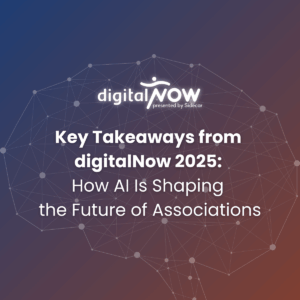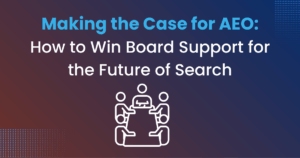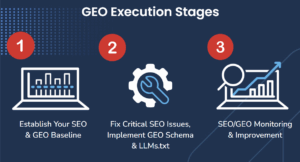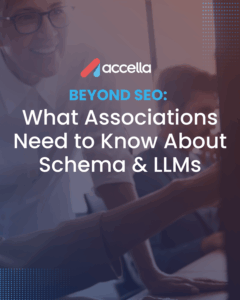In 2025, the rules of digital visibility are being rewritten — and fast. According to Gartner, 26.6% of scraped keywords now trigger AI overviews on Google’s results pages, pushing traditional organic results further down the screen. Meanwhile, 37% of CMOs are aggressively increasing their SEO/AEO investment, and by 2026, more than one-third of all web content will be created specifically for AI and search engine consumption.
“In 2026, 37% of CMOs are aggressively increasing their SEO/AEO investment.”
–Gartner, 2025
That means the competition for visibility, and credibility, isn’t just about ranking high anymore. It’s about being understood and cited by AI-driven tools like ChatGPT, Perplexity, and Google’s Search Generative Experience.
As an association leader, you already know the landscape of search is changing your association’s visibility and reach. But even when you understand the urgency, your board may not. Answer Engine Optimization (AEO) may sound like “just another marketing line item” or the new “SEO,” which has traditionally received very little investment.
So, how do you make the case for AEO in a way that helps the Board understand the potential impact, both positive and negative, and earns their buy-in and funding?
Associations exist to be the voice of authority in their industries.
Boards respond when they see a direct connection to the ability to deliver on their vision and mission. AEO isn’t about tinkering with code or keyword stuffing — it’s about ensuring that your members, policymakers, media, and the public can find and trust your expertise in the new era of AI-driven search.
Board takeaway: If we don’t adapt, our voice risks disappearing from the conversation.
“If you’re not in the answer, you’re not visible. Challenge your board to ask Gemini or ChatGPT the questions they want to be THE answer for. Get them invested in understanding how answer engines work and both the threat and opportunity they represent.” – Alyssa Hulka
If AI platforms don’t cite you, your authority erodes.
Associations produce some of the most authoritative, high-value content online. But if that content isn’t structured for AI to understand and cite, it will be overlooked and replaced by less credible or even incorrect sources. That means lower visibility, weaker influence, and reduced member value.
Board takeaway: Doing nothing puts us behind organizations that adapt faster.
Drive High-Value Revenue Streams
AEO isn’t just about visibility — it’s about conversion. As AI-generated overviews increasingly influence what users click, associations that optimize for these results can capture high-intent traffic from audiences actively seeking their expertise. That means more qualified leads, event registrations, and partnership opportunities driven directly from AI search experiences.
Board takeaway: AEO turns visibility into measurable growth — connecting your authority to real revenue impact.
Show Them The Numbers
AEO is tangible and trackable, so start but providing the Board with baseline measurements. Metrics like SEMRush’s SEO and AI visibility scores, prompt topics and citations, GPT inbound traffic from GA4 and more can all demonstrate your current state and show measurable progress over time. Positioning AEO as a future-proofing investment — with data to back it up — makes it easier for boards to get behind.
Board takeaway: This isn’t experimental spending. It’s a measurable, strategic investment.
“GPT sources have actually outpaced organic traffic and sometimes email traffic to sites and sources. It is eye-opening to see GPT outpacing the staple organic sources that we’ve seen hold true over the last 10–15 years.” – Merrik Kressley
The Bottom Line
The search landscape isn’t evolving — it’s transforming. AI-driven tools are rewriting the rules of discoverability, and associations that adapt early will define the next era of authority and influence. Answer Engine Optimization (AEO) ensures your mission, insights, and impact remain visible in a world where algorithms decide what gets seen.
Now is the time to act. Framing AEO as a mission-critical investment — not a marketing experiment — helps your board understand what’s truly at stake: your association’s relevance in the conversations that matter most.
Reach out today to schedule a consultation or request a custom AEO Readiness Report for your site.
Check out the rest of our AEO blog series:
“Meet the Minds Behind AEO: 5 Perspectives Guiding the Future of Search” Read Blog
“What Is Answer Engine Optimization?” Read Blog
“The Death of the PDF: Why AI Can’t Find You” Read Blog
“Why Associations Need to Budget for AEO in 2026” Read Blog
“Your GEO /AEO Webinar Replay + Complimentary AI Search Readiness Report” Watch Webinar






